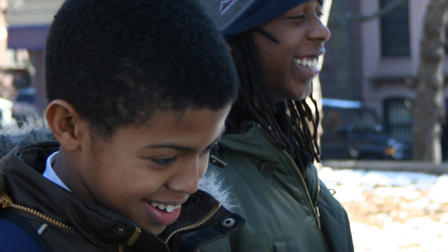Title: American Promise
Rada Film Group
Director: Joe Brewster, Michèle Stephenson
Screenwriter: Joe Brewster, Michèle Stephenson
Cast: Idris Brewster, Anthony Summers, Stacey O. Summers, Oluwaseun (Seun) Summers
Screened at: Review 1, NYC, 9/18/13
Opens: October 18, 2013
Though this film focuses on four African-Americans—Joe Brewster and Michèle Brewster and their child Idris, and Anthony Summers and Stacey O. Summers and their boy Seun (pronounced Shay-Awn), I can relate closely to their joys and fears. Like Idris and Seun, I am a long-term Brooklynite spending several years in a private high school, (Poly Prep), though I arrived straight from a public junior high where I had completed three years in a Special Progress class. I thought I was Einstein at the Montauk JHS, but my balloon was quickly deflated at Poly where I found myself competing with young men who had either gone to Poly from an early age or to some other prep school where the demands were undoubtedly higher than those I faced at age twelve. Like the young men in Joe Brewster and Michèle Stephenson’s documentary, I required long months of tutoring while many of my peers coasted through Trig, Plane Geometry and Biology. Though white, I believe I can understand at least a large part of the boys’ frustrations during their attendance at the prestigious Dalton School on New York’s Upper East Side where they, too, competed against others who were at least equally bright.
One of the boys, Seun, was not considered meritorious enough to advance to Dalton’s high school and transferred to Banneker, a public high in Brooklyn, where the contrast must have caused Seun some cognitive dissonance. Though Seun adapted readily and graduated, later to go on to Fredonia College in upstate New York, his future may not be as bright as that of Idris, his fellow Brooklynite who, despite having a psychiatrist father who attended Stanford was turned down there and from a few others, winding in L.A. at Occidental College. They should both do fine.
“American Promise,” probably inspired by Michael Apted’s famous “7-Up” series in which the director followed a group of people beginning when they were seven years old, and last year distributed “56-Up” which summarized their lives to date. Brewster and Stephenson’s “American Promise” has been 14 years in the making, cut down from 800 filmed hours to 2 hours and 15 minutes, originally focusing on five families which over the years of the filming narrowed down to just two. What’s remarkable is that the directors capture their pairs’ disappointments as well as successes, the presence of four cinematographers apparently not putting a damper on their arguments and rejections.
Idris, blessed with highly involved parents, one of whom attended Harvard and the other Columbia Law school, did not mix in as well as he might have had he attended a mostly African-American/Latino-populated public school. Nor did Seun, who was unable to bounce back as did Idris. Surrounded by white kids as two of just a few African-Amerian students, they and other black children were singled at for special tutorial attention as both needed extra help. Seun, in fact, was found not to be material to continue to Dalton High School and transferred to Banneker Academy in Brooklyn.
We get to know both boys as well as can be expected during the 135 minutes in which the cameras are aimed largely at them. Idris became the only freshman on the Dalton basketball team but is kidded about his short height and criticized by his demanding dad for not putting forth his best effort on the court. Seun, as sweet a kid as Idris, is diagnosed only in tenth grade with Attention Deficit Disorder and is hardly able to keep up with school pressure. Nor does it help his stability that his mother is afflicted with colon cancer which had spread to her lymph nodes and his kid brother dies in an unexplained accident at home.
The film, which appeared at the 2012 Sundance Film Festival in U.S. documentary competition, is a testament to the loving pressure of two sets of parents and to the ways that two African-American boys deal with kids racially different from them. (Seun’s mother, in fact, admits that she is not always comfortable among white folks but wants her son to fit in with them as with those of his own race.) The doc is filled with poignant moments, good acting by four sets of “nonprofessional” performers who appear to ignore the omnipresence of cameras, and, to coin a cliché, the boys laughed, they cried, their joys and disappointments parts of all our lives.
Unrated. 135 minutes © 2013 by Harvey Karten, Member, New York Film Critics Online
Story – B+
Acting – B+
Technical – B+
Overall – B+

